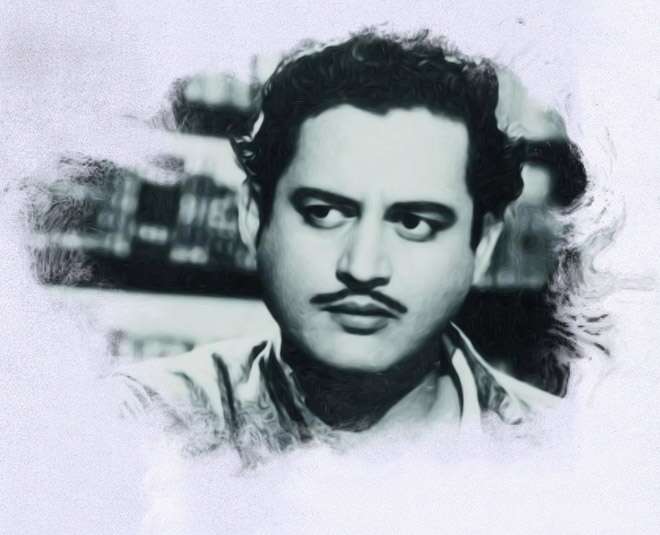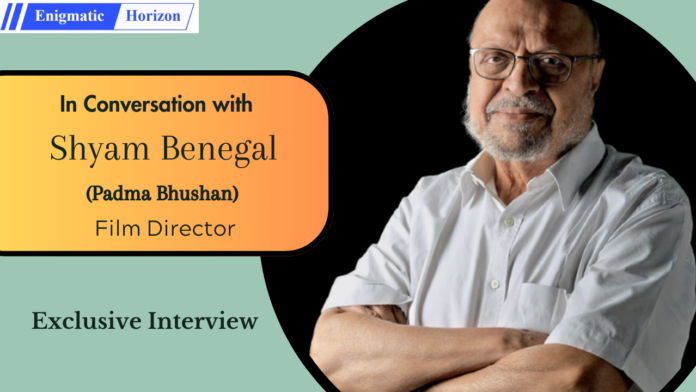Interviewed by – Shashi Salwani
Edited by – Robin Bhuyan (Editor in Chief)
Written by – Nupur Jha
Shyam Benegal is a renowned Indian filmmaker. Known for pioneering parallel cinema, he is also the most veteran and senior living film director in Hindi cinema, and arguably the best!
Benegal has made impactful films like Mandi, Netaji Subhas Chandra Bose: The Forgotten Hero, Manthan, Zubeidaa, Ankur, and Well Done Abba. Over the years, he has won numerous awards, including the Nandi Awards, the Filmfare Awards, Dadasaheb Phalke Award, Padma Shri, Padma Bhushan, and an impressive eighteen National Film Awards.
In an exclusive interview with Enigmatic Horizon, Benegal talked about his journey, the people who inspired him, and how he got started in filmmaking. He also shared his thoughts on how AI and streaming platforms are changing the movie industry.
What was it that inspired you to become a filmmaker?
My inspiration to become a filmmaker came from my father, Sridhar B. Benegal. He was a photographer and ran his own studio. Filmmaking was more than just a hobby for him; he owned a 60-millimeter silent camera and would often create movies at home. These films usually revolved around our family life, capturing moments with relatives, cousins, and children.
As a child, I remember my father showing these homemade movies to us and others. Growing up surrounded by his creative pursuits sparked my interest in the art of filmmaking, and both my sibling and I became intrigued by the process.
What was your journey like as a director in the beginning?
Growing up surrounded by filmmaking equipment at home, I asked my father if I could try my hand at making films. With his encouragement, I wrote my first script and shot a film, “Chuttiyon Mein Mauj Maza,” during the summer holidays in Hyderabad.
Involving my family and cousins as actors, I learned the ropes of filmmaking through hands-on experience. As I immersed myself in the process, I developed a passion for storytelling and the technical aspects of filmmaking.
Seeking guidance, I approached my cousin the veteran director Guru Dutt to become his assistant. However, he advised me to jump straight into directing, which ignited my determination to pursue filmmaking wholeheartedly.

How did you begin your career?
When I arrived in Bombay, I initially found no opportunities in the film industry. Instead, I entered the advertising field, starting my career by writing copy for a housing agency that collaborated with Hindustan Lever.
Among all your movies, which is the most important or impactful for you?
I would say – Ankur. It also provided unique opportunities to the people who worked in the film, and it helped them advance in their careers.
What are your thoughts on the ongoing discussions about nepotism?
When it comes to nepotism, I don’t find it particularly troubling. It’s akin to a tradition where skills or professions are passed down from one generation to the next.
For instance, if you’re a goldsmith, it’s natural for your child to follow in your footsteps. This passing down of knowledge isn’t necessarily nepotism; it’s simply carrying forward a craft or expertise. However, nepotism becomes an issue when someone is favored unfairly at the expense of others. That’s where the problem lies.

What is your opinion on OTT platforms, and do you believe they will negatively impact cinema?
Cinema is more than just a product; it’s also a medium of expression. Just as television has become a platform for cinematic experiences, cinema itself has evolved to be accessible through various mediums, whether it’s OTT platforms or smartphones.
Recently, and in the past few years, a lot of violent or vulgar content and movies can be seen. So, what is your opinion regarding such movies?
To be honest, I have no interest in making such movies. I have always made clean movies that everyone can watch, and I would love to continue this way.
What are your thoughts on AI and how is it affecting the filmmaking industry?
I believe AI is an incredibly valuable tool in filmmaking. It serves as an extension of our creative capabilities, enabling us to accomplish tasks that were previously challenging or impossible. While some express concerns about potential misuse or dependency leading to loss of control, I see AI as a tool that can greatly enhance our creative processes and streamline production workflows.

Is there a particular new-generation filmmaker that you consider the best?
Cinema is an art form, and its appreciation is highly subjective. Your preferences and personal taste greatly influence the kinds of films you enjoy.
While there are certain fundamental rules and grammar in filmmaking, it’s essential to recognize that cinema encompasses much more than just these technical aspects. Aesthetic plays a crucial role in how we engage with and interpret cinematic works.
Do you have any advice for aspiring filmmakers?
I don’t have specific advice, but it’s worth noting that there’s a plethora of expensive media out there, so it’s wise to proceed with caution.
What upcoming projects do you have in the pipeline?
I have a completed film about Sheikh Mujibur Rahman, which has been released in Bangladesh, France, Britain, and Canada. However, it hasn’t been released in India yet.
Thank you very much for giving us your time.
Thank you!
If you’re into powerful storytelling and immersive worlds beyond cinema, check out some of our other articles on the importance of making an Indian historical action game, as well as our list of longest open world games. and how virtual reality in gaming will change the world of entertainment.
